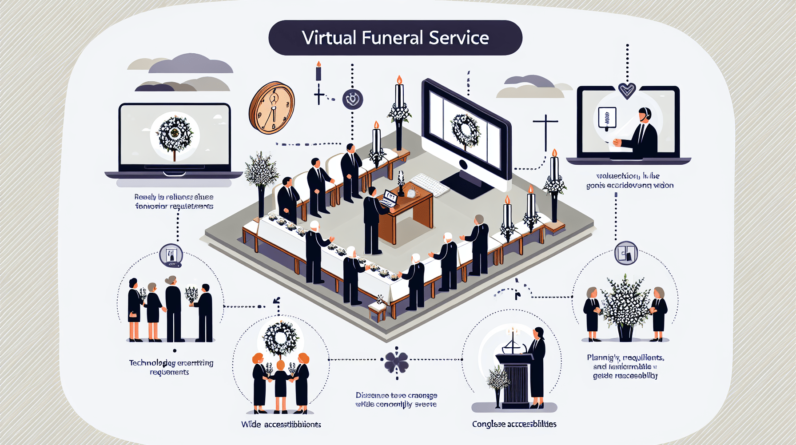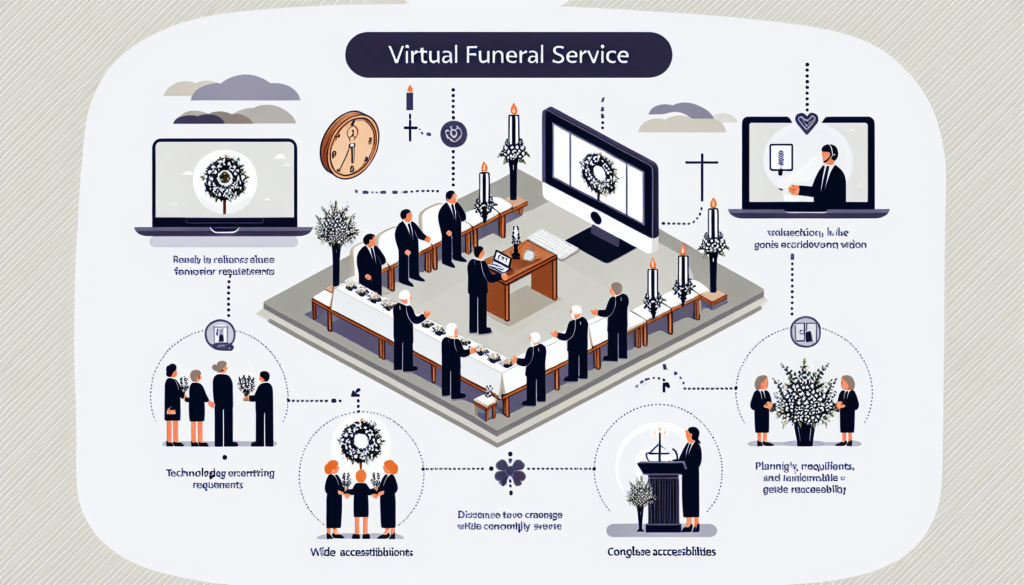
Losing a loved one is never easy, and with the current pandemic, traditional funeral services have become increasingly challenging to organize. That’s where virtual funeral services come in. In this guide, we’ll walk you through the ins and outs of arranging a virtual funeral service in Houston, Texas. From understanding the benefits to navigating the process, we’ll provide you with all the information you need to honor and say goodbye to your loved one from the comfort of your own home. Let’s explore the world of virtual funeral services together.

Understanding Virtual Funeral Services
Definition and Overview
Virtual funeral services are ceremonies held online, allowing individuals to honor and remember their loved ones remotely. These services have gained popularity in recent years, especially in light of the global challenges faced today. With the advancement of technology, virtual funerals offer a dignified alternative to traditional in-person gatherings, providing an accessible and inclusive way for people to come together and pay their respects.
Rise in Popularity Amidst Global Challenges
The unprecedented events of the past year have brought about significant changes in the way we navigate various aspects of life, including funerals. With restrictions on travel, gathering sizes, and concerns about health and safety, virtual funeral services have emerged as a viable option. As a result, there has been a surge in their popularity, as more people seek alternative ways to honor their loved ones while adhering to the necessary precautions.
Comparing Virtual to Traditional Funerals
While traditional funerals hold a significant place in our culture, virtual funerals offer several distinct advantages. One notable benefit is the ability to accommodate a wider participation. Virtual services eliminate the constraints of physical distance, allowing friends and family from around the world to come together and share their condolences. Moreover, virtual funerals reduce travel and accommodation costs, making it financially feasible for more individuals to attend and pay their respects. Additionally, virtual funerals address health and safety concerns, ensuring that individuals can participate in the ceremony from the comfort and security of their own homes.
The Benefits of Virtual Funerals
Allows for Wider Participation
Virtual funerals transcend geographical boundaries, enabling individuals from different locations to come together and commemorate the life of the deceased. Unlike traditional funerals that require physical presence, virtual services allow friends and family to participate regardless of their location. This inclusivity fosters a sense of unity and support, as loved ones can grieve collectively and share their memories and condolences in real time.
Reduces Travel and Accommodation Costs
Traveling to attend a funeral can often be a burden, both emotionally and financially. Virtual funerals eliminate the need for long-distance travel, thereby reducing transportation and accommodation costs. This not only makes it easier for friends and family to attend but also ensures that financial constraints do not prohibit individuals from participating in the ceremony. By removing these barriers, virtual funerals enable a wider network of support and create a more accessible environment for all.
Caters to Health and Safety Concerns
In times of global challenges and health crises, the safety and well-being of attendees become paramount. Virtual funerals provide a safe alternative to physical gatherings, allowing individuals to pay their respects while minimizing the risk of exposure to contagious illnesses. By embracing virtual platforms, participants can adhere to health guidelines and protect themselves and others, providing peace of mind during difficult times.
Planning a Virtual Funeral in Houston
Selecting the Right Platform
Choosing the right platform is crucial for a smooth and meaningful virtual funeral experience. Several platforms are available, each offering unique features and functionalities. Consider factors such as ease of use, technical support, and the ability to accommodate the anticipated number of attendees. Popular options include Zoom, Microsoft Teams, and Google Meet, among others. It is advisable to research and test different platforms to determine which one best suits your needs and the expectations of your attendees.
Creating a Guest List
When planning a virtual funeral, it’s important to create a guest list that includes individuals who are vital to the deceased and their immediate family. While virtual services can accommodate a larger number of participants, it is advisable to keep the ceremony intimate to maintain a meaningful and personal experience. Consider reaching out to close friends, family members, and colleagues who would want to attend, and communicate the details of the virtual funeral in a timely manner.
Scheduling and Time Zones Consideration
Virtual funerals require careful consideration of time zones, especially when attendees are scattered across different locations. Determine a suitable time for the service that accommodates the majority of participants and minimizes inconvenience. Communicate the schedule in advance, providing clear instructions on how to join the virtual funeral at the specified time. Remember to be sensitive to participants who may be in mourning and adjust the timing accordingly.
Technical Setup for Virtual Funerals
Equipment and Software Requirements
To ensure a seamless virtual funeral experience, it is important to have the necessary equipment and software in place. At a minimum, a reliable computer or mobile device with a webcam and microphone is required. Additionally, make sure you have a stable internet connection to prevent any disruptions during the ceremony. Familiarize yourself with the selected platform’s software requirements and ensure that your device meets them.
Testing Internet Connectivity
A stable internet connection is essential for a smooth virtual funeral experience. Before the ceremony, conduct a test to ensure that your internet speed is sufficient. This can be done by visiting online speed testing websites or contacting your internet service provider. If your connection is found to be inadequate, consider troubleshooting or upgrading your internet package in order to avoid any potential disruptions during the funeral service.
Troubleshooting Common Technical Issues
While technical issues can occur during even the most meticulously planned events, being prepared can help mitigate potential disruptions. Have a backup plan in place, such as having a dedicated technical support team available during the funeral service to address any unforeseen problems. Communicate troubleshooting steps to participants in advance, providing them with resources or contact information for technical assistance. By being proactive and prepared, you can ensure a smooth and uninterrupted virtual funeral experience.
Designing a Virtual Funeral Program
Outline of the Ceremony
Designing a comprehensive program is essential for a meaningful and organized virtual funeral. Begin by outlining the structure of the ceremony, including key elements such as opening remarks, tributes, prayers, and closing remarks. Consider incorporating personal touches that reflect the life and personality of the deceased, such as favorite quotes, songs, or readings. By carefully planning the flow of the ceremony, you can create a cohesive and impactful experience for all participants.
Incorporating Multimedia Elements
Virtual funerals provide the opportunity to incorporate multimedia elements that can enhance the overall experience. Consider including photos, videos, or slideshows that showcase memorable moments from the life of the deceased. These visual elements can evoke emotions and foster a deeper connection among participants. Additionally, explore the possibility of live streaming musical performances or pre-recorded messages from friends and family. These multimedia elements can bring a sense of warmth and personalization to the virtual funeral.
How to Include Traditional Funeral Elements Virtually
While virtual funerals offer flexibility and unique opportunities, it is important to honor and include traditional funeral elements as well. Adapt traditional rituals to the virtual realm by exploring creative ways to incorporate them. For example, lighting candles virtually, displaying pictures of the deceased, or reciting prayers and readings can help maintain the familiar elements of a traditional funeral. By striking a balance between innovation and tradition, you can create a respectful and meaningful funeral service that acknowledges both the past and the present.
Inviting Guests to a Virtual Funeral
Best Practices for Sending Invitations
When inviting guests to a virtual funeral, it is important to approach the process with sensitivity and clarity. Craft a thoughtful invitation that expresses the purpose of the event, explains the logistics of the virtual gathering, and requests RSVPs. Include the date, time, and instructions on how to join the virtual funeral, emphasizing the significance of the occasion. Send the invitations well in advance, giving guests ample time to prepare and participate in the ceremony.
How to Ensure Privacy and Security
Privacy and security are critical considerations when organizing a virtual funeral. To protect the privacy of participants, utilize the features offered by the selected platform, such as password protection or waiting rooms. This ensures that only invited guests can access the virtual funeral and provides a secure environment for sharing personal memories and emotions. Communicate these privacy measures to participants, assuring them of the utmost care in handling their personal information.
Guidelines on Etiquette and Dress Code
Establishing guidelines on etiquette and dress code helps maintain a respectful and solemn atmosphere during the virtual funeral. Communicate expectations to participants, emphasizing the importance of appropriate behavior and attire. Encourage attendees to dress in a manner that reflects the significance of the occasion, just as they would for a traditional funeral. Remind participants to mute their microphones when not speaking and to refrain from any distracting or disrespectful behavior that could detract from the solemnity of the event.
Conducting a Virtual Memorial Service
Roles and Responsibilities of Participants
In a virtual memorial service, each participant has a unique role to play in ensuring a meaningful ceremony. Family members may take on the responsibility of delivering tributes, sharing memories, or leading prayers. Friends and colleagues can offer their condolences and share anecdotes about the deceased. It is crucial to communicate these roles and responsibilities in advance, providing participants with an opportunity to prepare and contribute to the overall atmosphere of the virtual service.
Facilitating Virtual Interaction Among Guests
Although virtual funeral services may lack the physical presence of loved ones, it is still possible to foster interaction and connection among attendees. Encourage participants to engage through chat features, where they can share messages of support or memories about the deceased. Consider incorporating interactive elements such as virtual guestbooks or dedicated breakout rooms where smaller groups can engage in heartfelt conversations. By creating a virtual space that encourages interaction, participants can find solace in coming together to remember and honor their loved one.
Recording the Service for Future Viewing
Recording the virtual memorial service allows for future viewing and reflection, providing an opportunity for those unable to attend the live event to participate at their convenience. Seek consent from participants to record the service, ensuring respect for their privacy. After the funeral, make the recording available to those who wish to revisit the ceremony or share it with others who could not be present. This recording serves as a tangible memento, capturing the essence and significance of the virtual funeral for years to come.
Grieving and Support in a Virtual Space
Creating Spaces for Sharing Memories
Virtual funeral services can provide a platform for sharing memories and supporting one another in the grieving process. Consider creating dedicated spaces, such as online memorial websites or social media groups, where participants can share photographs, stories, and reflections about the deceased. These virtual spaces offer comfort and solace, allowing friends and family to connect and find support, even from a distance.
Virtual Support Groups and Counseling
In the aftermath of loss, individuals may find solace in connecting with others who have experienced similar grief. Virtual support groups and counseling services offer a safe and accessible environment for individuals to seek guidance and support. These online resources connect participants with trained professionals and provide a space for sharing experiences, emotions, and coping strategies. By availing these virtual support systems, individuals can find comfort and navigate the grieving process with understanding and compassion.
Follow-up After the Virtual Funeral
Once the virtual funeral service has concluded, it is important to follow up with attendees, expressing gratitude for their participation and acknowledging the impact of their presence. Consider sending personalized thank-you messages or virtual tokens of appreciation to show gratitude for their support during this difficult time. Additionally, provide resources for grief counseling and ongoing support, ensuring that attendees have access to the help they may need in the days and weeks following the funeral.
Virtual Funeral Service Providers in Houston
Overview of Local Providers
In Houston, there are several virtual funeral service providers who specialize in facilitating online ceremonies. These providers offer bespoke options tailored to meet the unique needs of families and individuals, ensuring a respectful and seamless experience. It is advisable to research and compare local virtual funeral service providers, taking into consideration their expertise, reputation, and testimonials from previous clients. By choosing a reliable and professional provider, you can have the utmost confidence in the virtual funeral services they offer.
Comparing Services and Pricing
When evaluating virtual funeral service providers, it is important to compare the services and pricing they offer. Consider factors such as customization options, technical support, and the ability to accommodate specific needs or preferences. While price is an important consideration, it should not be the sole determining factor. Seek providers who offer competitive pricing while ensuring a high level of service and support. Compare quotes and packages from different providers to make an informed decision that meets your requirements and budget.
How to Choose the Right Provider
Choosing the right virtual funeral service provider is crucial for a seamless and meaningful ceremony. Start by identifying your specific needs, such as the expected number of attendees or any unique requirements for the service. Research local providers, reviewing their websites, testimonials, and online presence to gain insights into their expertise and capabilities. Engage in conversations with potential providers, asking pertinent questions and seeking clarification on any concerns you may have. By selecting a provider that aligns with your vision and requirements, you can ensure a virtual funeral service that honors the memory of your loved one with utmost care and professionalism.
Feedback and Continuing the Legacy
Collecting Feedback for Future Services
Feedback is essential for improving future virtual funeral services. After the ceremony, reach out to participants and ask for their feedback on the overall experience. Inquire about the strengths and areas for improvement, paying attention to their suggestions and recommendations. Analyze the feedback collected and incorporate valuable insights into your future planning. By continuously seeking feedback, you can ensure that each virtual funeral service becomes a more meaningful and supportive experience for everyone involved.
Creating an Online Memorial
To honor the legacy of the deceased beyond the virtual funeral, consider creating an online memorial. These digital platforms provide a space where friends and family can share memories, photos, and stories about the departed. Online memorials offer a lasting tribute that can be accessed and cherished by loved ones for years to come. Research different online memorial platforms or consult with virtual funeral service providers to explore options and find the most suitable way to create a personalized and enduring memorial.
Ways to Honor the Deceased Beyond the Service
Honoring the deceased extends beyond the virtual funeral service itself. Encourage family and friends to continue honoring the memory of their loved one in meaningful ways. This can include sharing stories and reminiscing about special moments, supporting causes or charities that were important to the deceased, or organizing events or fundraisers in their honor. By keeping the memory of the departed alive through acts of kindness and remembrance, their legacy can continue to inspire and touch the lives of others.
In conclusion, virtual funeral services have become a viable and meaningful option in the face of global challenges. They allow for wider participation, reduce travel costs, and cater to health and safety concerns. Planning and executing a virtual funeral involves selecting the right platform, creating a guest list, and considering time zones. Technical setup requires the necessary equipment, testing internet connectivity, and being prepared to troubleshoot common issues. Designing a virtual funeral program involves outlining the ceremony, incorporating multimedia elements, and finding ways to include traditional funeral elements virtually. Inviting guests involves best practices for sending invitations, ensuring privacy and security, and providing guidelines on etiquette and dress code. Conducting a virtual memorial service includes considering the roles and responsibilities of participants, facilitating virtual interaction among guests, and recording the service for future viewing. Grieving and support in a virtual space involve creating spaces for sharing memories, accessing virtual support groups and counseling, and providing follow-up after the virtual funeral. Choosing the right virtual funeral service provider in Houston involves an overview of local providers, comparing services and pricing, and carefully evaluating their suitability. Collecting feedback, creating an online memorial, and finding ways to honor the deceased beyond the service can contribute to a meaningful and lasting legacy.





